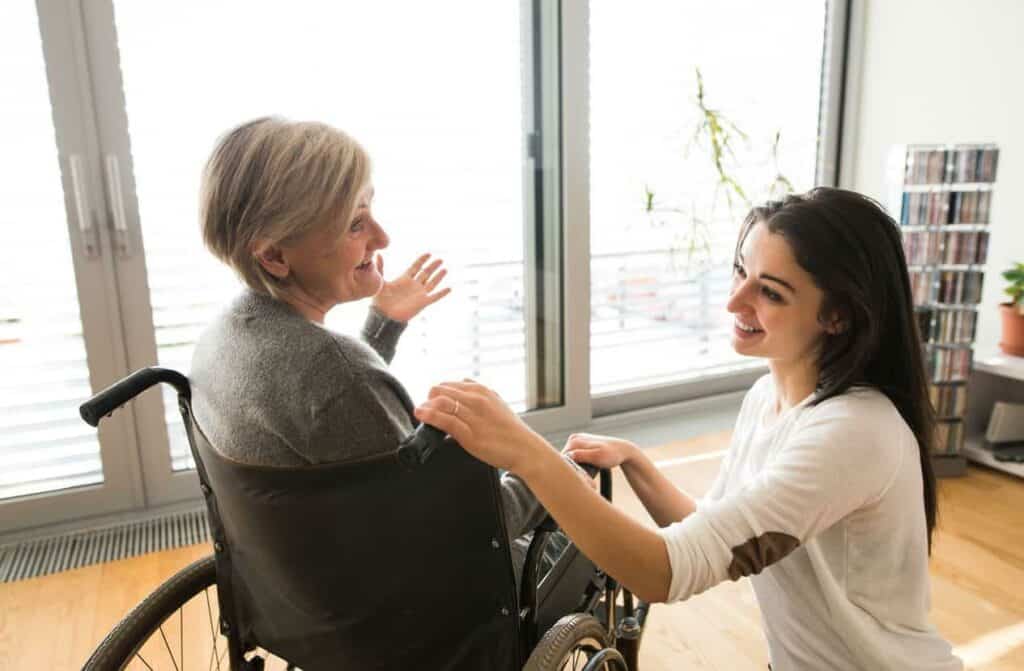
Is your loved one retiring soon? While most seniors these days leave the workplace in good health, it’s not an exaggeration to find an assisted or nursing home for them before they retire.
Deciding on your loved one’s next home can take months, so the earlier you shortlist your choices, the more likely your decision will favor your senior parents. As you learn more about what each facility offers, its features and services, and its drawbacks, the better baseline you have for the best environment for your loved one.
Learn what to consider when picking the best nursing homes in Sparks.
Different Types of Care and Living Options Available

Various senior living choices are available to cater to seniors’ varying needs and preferences. There’s a suitable option for those needing minor assistance and people with high care needs.
1. Independent living
It is ideal if your senior mom or dad can live independently but require minimal assistance, such as preparing their meals, maintaining the upkeep of the home, or managing their meds. Independent living communities offer a range of amenities and social activities to encourage an active lifestyle while having a caregiver on standby for minor support.
2. Assisted living
This option is suitable if your relative needs more assistance with day-to-day activities, such as laundry, cooking, and going to the doctor’s checkups, but still wants to be self-sufficient. Assisted living provides support with personal care, medication management, and home maintenance. Amenities and features make various care accessible to help seniors thrive and live independently. They offer group activities to socialize with other residents, such as art and fitness classes and games.
3. Nursing homes
These facilities are designed for seniors who require skilled care services. Examples are those who have severe ailments, cognitive impairment, and disability. A nurse or caregiver provides round-the-clock care, and medical supervision onsite and often offers skilled nursing care and rehabilitation services.
4. Memory care
This senior living option is specifically tailored to people with Alzheimer’s or other forms of dementia. The facilities provide a secure and structured environment with staff trained to care for individuals with memory loss.
5. Home care
Services allow older people to age in place and receive assistance in their own homes. A caregiver provides personal care, housekeeping, medication management, and meal preparation support.
6. Hospice and palliative care
Hospice care centers on providing pain relief and comfort for individuals with terminal illnesses. Care services help manage pain and symptoms to improve patients’ quality of life.
You’ll likely help your loved one decide which senior living option is best. Carefully consider their needs, preferences, and financial capability. It’s vital to have the means to sustain long-term care. Consult with a senior living expert to help uncover other sources of paying for care. Tour facilities to get a firsthand experience of what the atmosphere is like within the compound and how caregivers treat residents.
If you and your loved one have decided that nursing home care is best for your loved one’s needs, knowing what services to look out for and how to choose the right nursing home is vital.
Essential Services to Look Out for in a Nursing Home
Your loved one’s care demands will change as their condition improves or progresses. Here is the list of essential services they need.
1. Healthcare management
As seniors’ ability to manage their health declines, they need a care professional to assist with their medications, doctor’s appointments, and other care aspects. Coordinating medical care can become overwhelming for seniors. A caregiver in a Sparks nursing home can ensure they receive timely treatment and necessary follow-up care.
2. Mobility support
Along with the decline in independence is the senior’s need for assistance with walking, getting in and out of bed or chairs, and using assistive devices. Mobility support can reduce the risk of falls and accidents.
3. Personal care
Older people may require support with activities of daily living such as bathing, dressing, and toileting. Looking and feeling clean can increase their self-esteem. Assistance with grooming can help maintain their independence and minimize the risk of infections that can exacerbate their existing conditions.
4. Companionship
Loneliness and social isolation can impact mental and emotional health. Having someone to talk to and share their ideas with can improve their mood and provide a sense of belonging.
5. Proper nutrition
A balanced diet is crucial for overall health. Suppose your loved one has difficulty cooking or has specific dietary needs. In that case, nursing or assisted living homes have chefs who can help create a meal plan, shop for groceries, and prepare wholesome meals suitable for those with nutritional restrictions.
6. Physical activities
An active lifestyle is a massive component of a happy retirement life. With the support of an assisted living caregiver, your loved one can do their morning walks or exercise routines safely.
Choosing the Right Nursing Home for Your Loved One

When choosing a nursing home, the factors to consider are similar to when selecting assisted or memory care living for your senior mom or dad. It’s best to have a checklist to tick off when you feel satisfied with the facility’s features or amenities.
Factors to consider when choosing a nursing home
Here are some factors that can be converted into a checklist to guide you in choosing the best next home for your loved one.
- Location: Find a nursing home that’s close to family and friends. It retains the familiar environment and makes visitation easier.
- Facility features and care services: A standard nursing home has a different feel as you enter the facility since most people living there are terminally ill. Look for a compound with a home-like and calm feeling. Evaluate the services the staff provides. Ensure the site is clean and comfortable and help is accessible.
- Staff qualifications: Inquire if the nursing home employs qualified care professionals, such as nurses, doctors, and therapists. It ensures your loved one’s carer can respond to their needs appropriately.
- Reputation: A quick online search will give insight into the facility’s reputation. Read online reviews or ask friends with experience with the nursing home.
- Safety measures: Since your loved one is likely too frail and their risk for accidents is high, ask about the safety measures to prevent them. The staff should be physically strong to assist your loved one whenever they want to move around.
- Personalized care: Nursing home residents have unique conditions, so ensure the care staff can customize their service according to the needs of each resident. Be it dietary restrictions, memory care, or skilled services, pick a home with enough staff to provide personalized and adequate care for each resident.
- Finances: Lastly, nursing homes are more expensive than independent assisted living mainly because most delivered services are skilled. Consider the cost and assess if it’s sustainable for a few years. You can explore other financing options, like insurance coverage or government and state assistance programs.
Steps to take when making a decision

Deciding on your loved one’s next home requires planning and months of decision-making to ensure you avoid future relocations. Transferring to another facility can be stressful and take a toll on their mental and physical health.
Here are the general steps to help guide you through the process. You can tweak it according to your relative’s needs and preferences.
1. Research
Start by collecting information about the nursing homes in your area. You can do this online or ask from your network. Make sure the facility can provide the level of care your parent needs.
2. Visit the facility
Schedule a tour and observe the interactions between staff and residents. Add factors like cleanliness and order for consideration.
3. Engage with the staff
Inquire about the staff-to-resident ratio and their approach to care. You should be able to converse with the nurses or caregivers.
4. Talk to the admin
Feel free to talk to the admin staff if you have clarifications. Things such as community fees, services covered by the monthly rate, and the cost of standalone services can give you an idea of how to afford the expenses.
5. Ask for recommendations
If the nursing home is near your location, a friend or someone from your network likely has family relatives who have moved into the nursing home. Ask for their advice and feedback.
Exploring Unique Amenities at Amy’s Eden in Sparks

The most significant advantage of Amy’s Eden home is the 1:2 staff-resident ratio. One care staff only takes care of up to two residents, ensuring each receives more care hours. Other features that make Amy’s Eden stand out from competitors include:
1. A home-like feel
Contrary to a larger-facility atmosphere, residents love the home-like familiar environment of the homes. There’s no structured schedule or routine as residents can do what they want and decide on doing activities spontaneously — like they’re at their own homes.
2. Nutritious meals
The caregiver prepares three wholesome meals a day and snacks for two residents. Your loved one won’t have to worry about cooking their meals and doing the dishes.
3. Exercise classes
Amy’s Eden brings over fitness instructors to offer exercise classes to residents. This appeals to seniors who want to maintain an active lifestyle throughout their golden years.
4. Some skilled services
Depending on the resident’s request, Amy’s Eden can arrange for a nurse or another care professional to offer some skilled and rehabilitation services, such as diabetes care and physical therapy.
5. Transportation services
The caregiver can arrange transportation from the home to the doctor’s office, mall, or another place your loved one wants to go.
6. Cost-effective
Compared to a larger nursing home, Amy’s Eden homes are more affordable, making it sustainable for the long term.
Understanding Costs and How To Pay for Senior Care

The financial aspect is one of the challenges for seniors who require care. The nursing home is the most expensive of various senior living options, as most services provided are skilled, and residents are mostly terminally ill. More professionals need to work together to care for one resident.
Breakdown of costs associated with nursing homes
The median cost of a nursing home is $9000 per month for a private room. A semi-private room is reasonably affordable, with a median price of $7,908 per month or $260 per day. In some states with a lower cost of living, such as Arkansas, a semi-private room could be $ 1,000 less than the median rate. In Nevada, a semi-private room costs $9,216. Expect to pay $10,007 for a private room.
The rate often covers lodging, meals, and care services. Some facilities may offer a-la-carte services that incur more costs. These services may depend on your loved one’s needs.
Common payment options for senior care
- Personal savings and retirement funds: The first source is typically personal savings and retirement funds set aside by your loved one to pay for care expenses in the future.
- Medicare: It provides coverage for Americans 65 years and older. While it does not typically cover long-term care, it helps finance short-term stays in nursing facilities and selected home health care services.
- Long-term care insurance: Depending on the type of policy, it can help cover the costs associated with senior living options, such as nursing homes and assisted living. It can also pay for home health care services.
- Veterans Administration (VA) benefits: If your loved one has served in the military, they may be eligible for assistance to help cover healthcare costs. The VA has an Aid and Attendance program that provides monthly stipends to pay for senior care.
- Medicaid: Medicaid provides supplemental financial assistance for healthcare, such as home care services. Each state sets eligibility requirements that your loved one needs to meet.
- Reverse mortgages: Senior homeowners may be eligible for a reverse mortgage. Your loved one can convert a portion of their home equity into cash, which they can use to pay for senior care services. This should be the last option, as reverse mortgages have potential drawbacks.
- Family support: Some family members can also pool funds and help their loved one pay for care.
- Charity organizations: Some non-profit organizations aim to help seniors access senior care services. You might have one within your community.
There are various financing options to help seniors alleviate the financial burden of care expenses. Adult children must familiarize themselves with this as they’re more likely to help decide on their senior parent’s long-term care options.
Things to Expect When Moving Into an Assisted Living or Nursing Home

Moving into a new environment can be challenging for seniors, especially if they’ve lived in the same home and neighborhood for decades. It’s one aspect family caregivers must understand, as fitting into a new environment may not be as easy as younger people. Moreover, the friends and relationships they’ve built with neighbors can be hard to let go of.
Expect resistance from your loved one when relocating to an assisted or nursing home. Here are things you can expect to happen.
Transitioning into a new living situation
Transitioning is a process, and adjusting to the new environment requires time. Give your loved one weeks or months to get used to their new home. During this time, they may complain about many things. Don’t argue and insist they’re wrong; listen to their feedback. It can give you ideas for consideration to help them settle in their new home.
Building relationships with staff and other residents
A good relationship with the people around them can help make the transition easier. If they befriend the staff and their neighbors, they can develop resilience against loneliness, depression, and other mental health problems. The outcome is they can fit in easily into their new environment.
Talk to the staff and your loved one’s neighbors when you visit. Your family will benefit by having an amicable relationship with them. They can provide emotional and social support to your senior parents when you’re not around.
Choosing Nursing Homes in Sparks With All-Inclusive Services
A critical feature of an ideal nursing or assisted living is its all-inclusive services. When your loved one can access all the services they need in one place, adjusting to the new environment becomes less stressful and overwhelming.
Choose a facility that offers varying levels of care services, both non-skilled and skilled. If your relative’s needs level up, the caregivers can adapt without problems. Relocation is associated with stress, anxiety, and other mental health concerns. You can avoid future issues by choosing a suitable nursing or assisted community for your loved one the first time.
Let Amy’s Eden provide your loved one with the exceptional care they need to thrive in our assisted homes. Contact us today to learn more.




